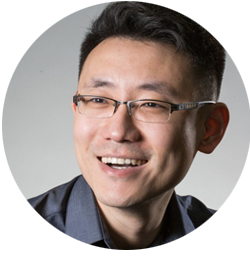Year: 2018
An AI Pioneer, And The Researcher Bringing Humanity to AI
Kai-Fu Lee (B.S. ’83) included in WIRED’s anniversary issue for his work that brings humanity to artificial intelligence.
Verizon sees 5G revolutionizing everything from surgery to education to transportation — so it’s opening high-tech labs in 4 cities by end of year
Verizon has said that 5G will revolutionize the world, enabling the latest advancements in industries from telemedicine to autonomous vehicles.
The 5G Race: China and U.S. Battle to Control World’s Fastest Wireless Internet
The early waves of mobile communications were largely driven by American and European companies. As the next era of 5G approaches, promising to again transform the way people use the internet, a battle is on to determine whether the U.S. or China will dominate.
Don’t want the police to find you through a DNA database? It may already be too late.
WASHINGTON – It’s a forensics technique that has helped crack several cold cases. Across the country, investigators are analyzing DNA and using basic genealogy to find relatives of potential suspects in the hope that these “familial searches” will lead them to the killer.
CS Welcomes New Faculty
The department welcomes Baishakhi Ray, Ronghui Gu, Carl Vondrick, and Tony Dear.

Baishakhi Ray
Assistant Professor, Computer Science
PhD, University of Texas, Austin, 2013; MS, University of Colorado, Boulder, 2009; BTech, Calcutta University, India, 2004; BSc, Presidency College, India, 2001
Baishakhi Ray works on end-to-end software solutions and treats the entire software system – anything from debugging, patching, security, performance, developing methodology, to even the user experience of developers and users.
At the moment her research is focused on machine learning bias. For example, some models see a picture of a baby and a man and identify it as a woman and child. Her team is developing ways on how to train a system and to solve practical problems.
Ray previously taught at the University of Virginia and was a postdoctoral fellow in computer science at the University of California, Davis. In 2017, she received Best Paper Awards at the SIGSOFT Symposium on the Foundations of Software Engineering and the International Conference on Mining Software Repositories.

Ronghui Gu
Assistant Professor, Computer Science
PhD, Yale University, 2017; Tsinghua University, China, 2011
Ronghui Gu focuses on programming languages and operating systems, specifically language-based support for safety and security, certified system software, certified programming and compilation, formal methods, and concurrency reasoning. He seeks to build certified concurrent operating systems that can resist cyberattacks.
Gu previously worked at Google and co-founded Certik, a formal verification platform for smart contracts and blockchain ecosystems. The startup grew out of his thesis, which proposed CertiKOS, a comprehensive verification framework. CertiKOS is used in high-profile DARPA programs CRASH and HACMS, is a core component of an NSF Expeditions in Computing project DeepSpec, and has been widely considered “a real breakthrough” toward hacker-resistant systems.

Carl Vondrick
Assistant Professor, Computer Science
PhD, Massachusetts Institute of Technology, 2017; BS, University of California, Irvine, 2011
Carl Vondrick’s research focuses on computer vision and machine learning. His work often uses large amounts of unlabeled data to teach perception to machines. Other interests include interpretable models, high-level reasoning, and perception for robotics.
His past research developed computer systems that watch video in order to anticipate human actions, recognize ambient sounds, and visually track objects. Computer vision is enabling applications across health, security, and robotics, but they currently require large labeled datasets to work well, which is expensive to collect. Instead, Vondrick’s research develops systems that learn from unlabeled data, which will enable computer vision systems to efficiently scale up and tackle versatile tasks. His research has been featured on CNN and Wired and in a skit on the Late Show with Stephen Colbert, for training computer vision models through binge-watching TV shows.
Recently, three research papers he worked on were presented at the European Conference for Computer Vision (EECV). Vondrick comes to Columbia from Google Research, where he was a research scientist.

Tony Dear
Lecturer in Discipline, Computer Science
PhD, Carnegie Mellon University, 2018; MS, Carnegie Mellon University, 2015; BS, University of California, Berkeley, 2012
Tony Dear’s research and pedagogical interests lie in bringing theory into practice. In his PhD research, this idea motivated the application of analytical tools to motion planning for “real” or physical locomoting robotic systems that violate certain ideal assumptions but still exhibit some structure – how to get unconventional robots to move around with stealth of animals and biological organisms. Also, how to simplify tools and expand that to other systems, as well as how to generalize mathematical models to be used in multiple robots.
In his teaching, Dear strives to engage students with relatable examples and projects, alternative ways of learning, such as an online curriculum with lecture videos. He completed the Future Faculty Program at the Eberly Center for Teaching Excellence at Carnegie Mellon and has been the recipient of a National Defense Science and Engineering Graduate Fellowship.
At Columbia, Dear is looking forward to teaching computer science, robotics, and AI. He hopes to continue small-scale research projects in robotic locomotion and conduct outreach to teach teens STEM and robotics courses.
A murdered teen, two million tweets and an experiment to fight gun violence
Researchers are using AI to decode the language of Chicago gangs. Next they’ll look for opportunities to intervene before online aggression turns deadly.
A Monitor’s Ultrasonic Sounds Can Reveal What’s on the Screen
AI For Humanity: Using AI To Make A Positive Impact In Developing Countries
Artificial intelligence (AI) has seeped into the daily lives of people in the developed world. From virtual assistants to recommendation engines, AI is in the news, our homes and offices. There is a lot of untapped potential in terms of AI usage, especially in humanitarian areas. The impact could have a multiplier effect in developing countries, where resources are limited. By leveraging the power of AI, businesses, nongovernmental organizations (NGOs) and governments can solve life-threatening problems and improve the livelihood of local communities in the developing world.
WuLab to present research on a query engine that supports tracking and querying lineage
Eugene Wu will also receive a Test of Time Award for WebTables: exploring the power of tables on the web at the VLDB Conference.

